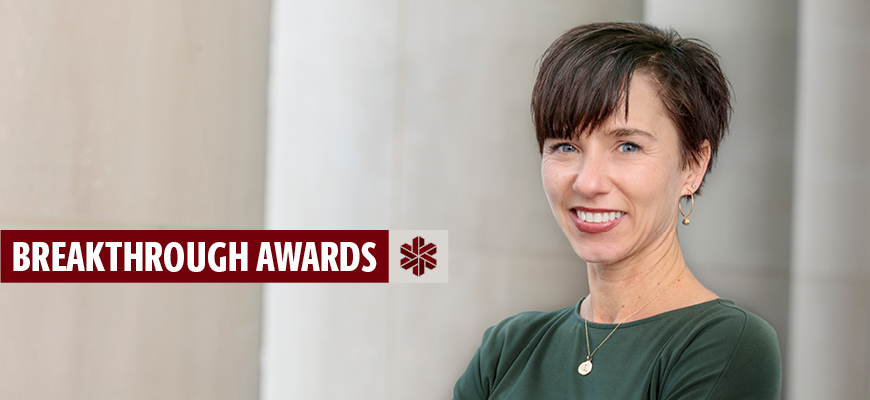
Breakthrough Star: Emily Suski
Law professor’s research focuses on children’s health, well-being
Posted on: July 14, 2022; Updated on: July 14, 2022
By Page Ivey, pivey@mailbox.sc.edu, 803-777-3085
Law professor Emily Suski’s research focuses on children and their health and well-being.
She takes a fresh look at Title IX protections for children in the K-12 school environment. She also works on the intervention side, creating a legal clinic to help when children’s health is put at risk by social factors.
“Her scholarship has filled a significant hole in a crucial area of law — Title IX’s regulation of public schools and their efforts to protect children from sexual harassment and sexual abuse,” says fellow law professor Josh Gupta-Kagan. “Her work explains how present legal practice and doctrine fails to protect children from sexual harassment and abuse at school and identify changes that courts should make to avoid the very real harms which result.”
Honestly, what first got me researching Title IX was parents who were calling me, as anti-bullying laws were enacted, saying their kids were being bullied in school.
Emily Suski
Suski has found that even though K-12 students experience more sexual harassment in school than do college students, they often receive less protection from sexual harassment under Title IX.
Suski’s research papers on the topic have appeared in the country’s top law reviews and she has made dozens of presentations on Title IX at various law schools and continuing education clinics. The research grew out of her law practice, which focused on education advocacy, particularly for children with disabilities and in special education.
“Honestly, what first got me researching Title IX was parents who were calling me, as anti-bullying laws were enacted, saying their kids were being bullied in school,” Suski says. “That can be a disability issue, a sexual harassment issue, a race issue. It can be many different protected class issues.”
Although children ostensibly are offered greater protection by Title IX than by anti-bullying laws, Title IX “does little to effectively protect children from sexual harassment in the public schools.”
Suski’s second research vein is the creation of a medical-legal partnership, with funding from the Duke Endowment, that works with local doctors to identify pediatric patients whose poverty negatively affects their health. Interdisciplinary legal advocacy provided by the partnership can address these social determinants of health.
The Carolina Health Advocacy Medicolegal PartnerShip (CHAMPS) is a collaboration of UofSC’s law and medical schools, Prisma Health and South Carolina Legal Services. In addition to the legal services provided by CHAMPS, the program also offers medical, law and social work students the opportunity to gain experience working with the clients.
Those students have contributed over 6,000 hours of legal services since the clinic began in 2017.
CHAMPS has reduced the number of cases referred to social services agencies, and Suski is working on a research project to quantify medical efficacy and cost savings associated with the clinic’s work. In addition, she is planning a randomized control trial to determine the extent to which CHAMPS prevents unnecessary child neglect referrals.
“There are no randomized controlled trials or other empirical studies of medical-legal partnerships to determine whether or to what extent they impact child neglect referrals,” Suski says of the study being conducted with Harvard Law School's Access to Justice Lab. “We ultimately think that our study and our medical-legal partnership could be a national model for pediatric-focused medical-legal partnerships as a primary child welfare prevention model.”